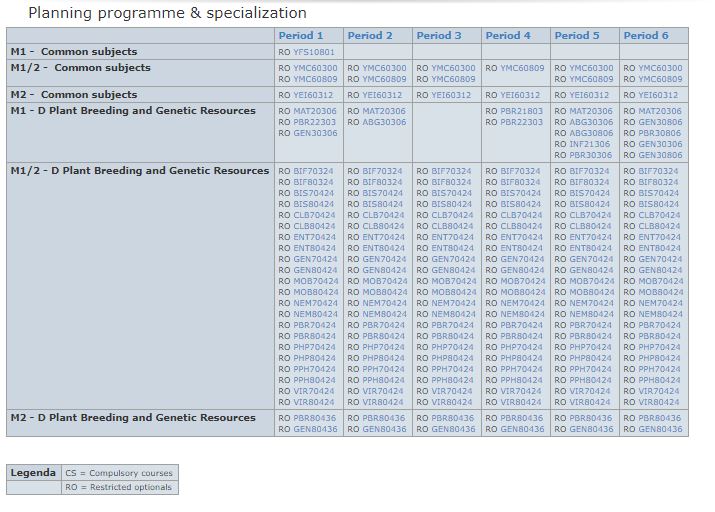Thesis Life: 7 ways to select appropriate courses
How to qualify for your thesis?
Study experience at WU is unique and eye-opening. It’s a power race with short study periods and loads of work and then some days off. Each study period brings its own challenges, fun and difficulties. Its like a short round of boxing with intense action and then a break to cool off before you start the next one. Most students, like me, struggle with keeping up with the courses while it is being taught and cope up during the preparation week prior to the exam (Yes, we have a week off to catch up! Unbelievable!)
All this dancing around then amounts to being competent enough to conduct a thesis project in the research group that you desire. So, after a long year or two of course work, you end up in the study adviser’s office. He/ she informs you that you are not eligible for a thesis and need to complete “XYZ” course before you can do it. That is a heartbreak like any other. You are then pressed for time and morally drained. It is a predicament most international students dread and try to avoid.
Recently, someone suggested that I write about how to choose courses. I realized that this is an often-neglected issue that has a lot of bearing. So, heeding this person’s suggestion, I have tried to compile a list of ways in which you can make proper choice of coursework so that you end up competent enough to conduct thesis work. This list is not suitable for advice regarding a particular study discipline or research group and its courses. I have tried to keep it as general as possible. So, here we go-
-
Select most courses from your department
Although it seems redundant, I will like to mention that each study programme has a list of compulsory and optional courses. Compulsory courses are what they exactly sound like. They form the core of your programme and you must complete them. Barring these, the optional courses make up the rest of your programme. Each department offers a plethora of optional courses. You can do RO (restricted optional) from your own department which send you in direction of a certain specialization or you can do optional courses from other departments which interest you.
Even though it sounds fun, it is wise to restrict your list of extra-departmental courses. This seems counter-intuitive at times. You have been freedom to do what you want, but this freedom must be experienced wisely. My suggestion would be to complete as many courses from your department as needed and then play around a bit to attain a broader scope of education.
-
Talk to your study advisor
After you have a certain rough plan in your mind, it is wise to talk to the study advisor. He/ she is usually somebody from the teaching staff of your department who has intimate knowledge of the Masters’ coursework. They can give practical advise regarding what to change in your plan and what to keep the same. They can also come up with alternate strategies for you to think over before you make any decision. That is why, it is imperative that you stay in touch with your advisor throughout you study.
Although, you can alter and trash your plan at any time as it is not binding, it is always better to stick to some specific plan and make small changes if needed.
-
Spend some time understanding the research group you are interested in
The most important part of your study is knowing what you are doing. It is often hard to zone in on a particular path that will define you for the rest of your life. If you are confused and on the fence between 2-3 specializations that you like, it is very important to talk to someone from all those research groups before you make a decision. Interview them for real and pick their brains for ‘what type of research happens in their research group? What are the future career options? Which specific skills do you need to work in that area? How did they end up where they are what is their story and ?’ These people that you interview may be PhD students, post-doc researchers, professors or even masters students who have completed a major thesis in that research group. Most people are happy to help.
-
Try and complete courses as soon as possible
As you turn the corner and start your coursework by registering to the courses that you decided upon, it is important to focus on the work. Sometimes, in the middle of the course you are discouraged or realize that this is too complicated or this is not interesting. If it is an optional course and is not prerequisite for your thesis, you can simply drop it and find something else. But if you continue and suppose (let’s hope this does not happen) you do not pass the exam on the first try, it is beneficial that you appear for the “resit exam” as soon as possible.
It helps to complete the course as soon as possible so that you do not have to carry the burden of incomplete courses throughout the length of your study. Some students unfortunately, also have to appear for exam during the course of their thesis which can prove very stressful.
-
Bane of Compulsory courses
Compulsory courses often form the skeleton of your study programme. They are done by all the students who have the same specialization as you do. These courses can range from being outright fun and easy to clear, to extremely difficult to complete. When the situation is on the worse end of the spectrum, unlike optional courses, you cannot drop out of these courses. You can do that and start with a whole new specialization, but that is time consuming and usually toxic for your performance.
The best way to deal with these courses is to force yourself to pay extra attention to them over other stuff. There is no way around it. If they are offered in multiple study periods, do try to register for them when there is very little stress. For example, if a course “XYZ-30306” is offered in 2nd, 3rd, 4th periods, its wise to register for it in period 3 and 4 since you can undertake it without having any other course simultaneously.
-
Get your SPA
Once you have completed all the courses that you THINK you need for your thesis, get the Study Programme Approval” from the examination committee of WUR. Your study adviser is responsible for the final submission of your SPA to this committee. It is always beneficial to do this prior to starting your thesis. Theoretically, you can submit this 6 months before you complete your whole study, but it is always advisable to do it before thesis to know where you stand.
Details of SPA are in this link.
-
Talk to your prospective supervisor
When you have done everything else on this list, the best way to approach the next academic year is to talk to your prospective thesis supervisor. This is a person, usually a professor or a researcher at your research group of interest, who will guide you and evaluate your thesis work. Often, the supervisor may stress on your performance in a certain course or group of courses. This is because the thesis that you will be undertaking has many elements that you learned from that course. It is always best to acknowledge this bias and brush up on those courses. You will be needing them for a long time. Even if you did not perform so well in them, you can always strengthen your concepts from that course prior to diving in your thesis work.
In conclusion, I will like to say that be informed and plan ahead. When things go sideways, make adjustments and keep working. Best of luck.






Great reading with good guidelines as usual. I remember my M.Tech. days at IIT long back. The boxing situation you referred was almost the same! Sweet memories!
Your 7 point advise on selecting courses will help new comers immensely.
All your blogs related to these topics need to compiled to make a booklet!
Thank you so much for writing this blog !! =)
Hi Pranav, I start my MSc at Wageningen this September and would like to get in touch with you if possible via email/facebook since I have some questions. I am from Mumbai, India and would like to know general things about studying, living in Wageningen and also about the introduction activities. Is there some way we can chat anytime soon?
– Nikita
Hi Nikita,
Please look me up on facebook/ Messenger.
Thank you.
Pranav